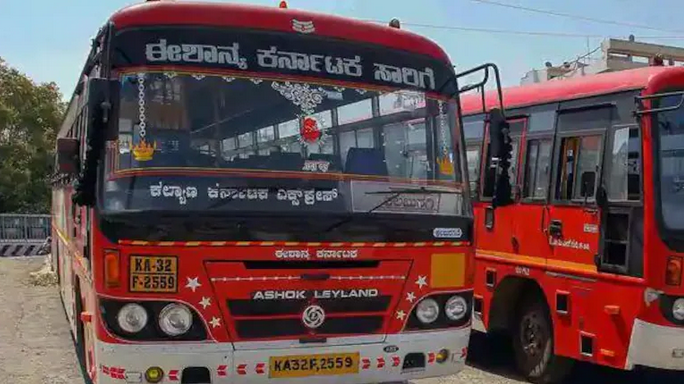
Karnataka transport strike enters Day 3; CM says pay hike not possible

The indefinite strike called by workers of state-run bus transport corporations entered its third day on Friday (April 9), with protesters holding the government responsible for the suicide of a driver due to pressure to return to work.
The workers have demanded a raise in pay in line with the state’s Sixth Pay Commission, which recommends a 30 per cent hike in salaries of state government employees and pensioners. They have also demanded the government to regularise contractual workers.
However, Chief Minister BS Yediyurappa has flatly refused to revise the salaries, while urging the protesters to end the strike and resume their duties. The government has issued temporary permits to private buses for the convenience of passengers when the strike is underway. Besides, the South Western Railway (SWR) informed that it will run additional trains from April 8 to 14 to accommodate passengers in the wake of the transport strike.
“Even in challenging circumstances, the government has already fulfilled eight of the nine demands of the employees of the transport companies. The salary allowance cannot be granted as per the Sixth Pay Commission,” the chief minister said.
Yediyurappa posted on Twitter that even during the COVID-19 pandemic when the revenue generation is a pittance, the state has paid ₹2,300 crore towards the salaries of transport workers.
“About 85 per cent of gross revenue is spent on wages, allowances, pensions, and other non-plan expenses, with little income available for development work,” the chief minister noted.
’ರಾಜ್ಯದ ಒಟ್ಟು ಆದಾಯದ ಶೇ. 85 ರಷ್ಟು, ವೇತನ, ಭತ್ಯೆ, ಪಿಂಚಣಿ ಮತ್ತಿತರ ಯೋಜನೇತರ ವೆಚ್ಚಗಳಿಗೆ ವ್ಯಯವಾಗುತ್ತಿದ್ದು, ಅಭಿವೃದ್ಧಿ ಕಾರ್ಯಗಳಿಗೆ ಅಲ್ಪ ಆದಾಯ ಲಭ್ಯವಿರುತ್ತದೆ. ಬಜೆಟ್ ಅಧಿವೇಶನದಲ್ಲಿ ವಿಪಕ್ಷ ನಾಯಕರು ಪ್ರಸ್ತಾಪಿಸಿದ್ದಂತೆ, ಯೋಜನೇತರ ವೆಚ್ಚ ಈಗಾಗಲೇ ಅಧಿಕವಾಗಿದೆ.’ (1/3)
— CM of Karnataka (@CMofKarnataka) April 9, 2021
The workers of Bangalore Metropolitan Transport Corporation (BMTC), Karnataka State Road Transport Corporation (KSRTC), North Western Karnataka Road Transport Corporation (NWKRTC), and North Eastern Karnataka Road Transport Corporation (NEKRTC), are on an indefinite strike since April 7.
According to Transport Department data, all four state-run transport corporations operate a fleet of 26,000 buses with the help of 1.37 lakh employees. Of this workers from around a thousand fleets are ready to resume work, the department said.
Workers, on the other hand, allege that the government has pressured employees to resume work and posted notices in front of their houses to vacate their quarters if they don’t join work.
Police on Friday reported that a transport department employee committed suicide in Transport Minister Laxman Savadi’s home district Belagavi. Shivakumar Nilgar, 40, who had been employed in the department for the past 12 years, died due to alleged pressure from higher up to resume work. Another worker attempted suicide by consuming poison in the Gadag district.
Reacting to the incident, Savadi said the worker committed suicide due to debts and not under any pressure from authorities.
Meanwhile, Anjum Parvez, principal secretary of Transport Department said the government is mulling to enforce the Essential Services Management Act (ESMA), which empowers the government to punish employees who refuse to serve in essential sectors. “We have permission from the Labour Department to use ESMA. We will initiate action if need be,” Parvez said.
It is pertinent to note that in February, amid the COVID crisis, a 38-year-old bus conductor working with the state-owned transport corporation posted on a social media site that he was ready to sell his kidney.
He said the salary cuts effected due to the pandemic worsened his financial condition.
“I am a transport employee. I don’t have money to pay for my ration and house rent. Hence, I have put my kidney on sale. Here is my phone number,” Hanumanth Kalegar, a NEKRTC worker in Gangavati posted on Facebook.
Meanwhile, opposition leader Siddaramaiah slammed the government over its failure to address the issue and asked the state to hold discussions with the employees rather than threaten them to resume work. He also blamed the Centre’s step-motherly treatment to Karnataka dented the state finances leading to a crisis situation.
People of Karnataka are already suffering from the pandemic, and the ongoing strike by KSRTC employees has resulted in the further loss to the people.
Inefficient & corrupt administration of @BJP4Karnataka govt is the only reason for this fiasco.
1/5#Ksrtcstrike
— Siddaramaiah (@siddaramaiah) April 8, 2021


